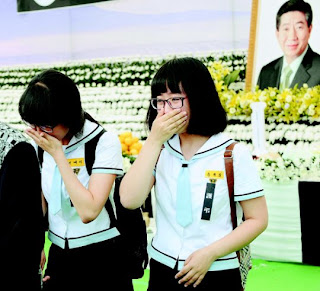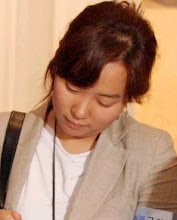Photo of people forming a virtual river against skyscrapers
Thursday, October 1, 2009
Wednesday, July 22, 2009
Survey at Last!
*What led them to participate in the protests, and how do they assess their actions one year on?
*How have they used off and online resources to reach out to their peers and a broader audience?
*How different have they become as political actors?
I've also teamed up with some of the best people in the field - the sociologists at Korea University, who have already done extensive research into the subject of youth and politics. While their focus hasn't been on gender, they've recently realized they need to look more into the aspect and were excited to find me working on essentially the same subject!
As of this morning, the survey's delivered to a carefully selected group of some 100 teenagers - more will follow. I can't wait for the results - which will come by early next week!
Sunday, July 12, 2009
Roh Moo-hyun and Return of Candle Girls

Roh was arguably the most internet-savvy president the world ever saw. Roh designed political organization software in his spare time. As president, he spearheaded the design of the presidential office’s electronic system. Pity the poor developers who had to discuss the platform with the incumbent president!!! To the dismay of the press office, Roh read much of what citizens had to say on the Chong Wa Dae website, and would reply real time, enabling citizens to keep track of what time he went to bed at night. (This article showcases the scope of Roh’s online activies http://www.asiamedia.ucla.edu/article-eastasia.asp?parentid=41344)
He was anti-authoritarian to a fault. When a group of prosecutors protested the president's efforts to reform the judiciary, he invited them for a group debate, which was televised live (which consequently proved in front of the nation how logically weak the prosecutors were when it comes to discussing their own privileges). He made his own coffee. He appointed a young but extremely capable woman, Kang Geum-shil, as the justice minister. Mind you, this is not in Scandinavia but in Korea, where less than three percent of the lawmakers were women.
My hypothesis is that some of the heightened self-esteem and political confidence of today's teenage girls comes from having grown up in the Roh Moo-hyun era, where a high number of important women in politics definitely sent a message. While browsing through statistics on women's political participation, I noticed that Chile was one of the handful of countries where young women's political ambitions surpassed that of men. The credit, of course, goes to President Bachelet. I believe something similar was going on in Korea from 2003 to 2007.
When I decided to spend the summer conducting research on the candlelit protests of teenage girls, I was thinking of the girls in the past tense. Although there was definitely a social and political context to the movement they led, I suspected it would metamorphose into something different, and that we would not see something as dynamic and drastic again for some time.
How wrong I was. Ever since Roh died, the girls have again become the leading force in honoring what they deemed was an honorable man. Lee Yun-gyeong, an 18-year-old senior who came to the funeral ceremony in Seoul City Plaza, summed up the situation as such: "The boys don't react much to Roh's death, they'd rather talk about sports or games. The girls, on the other hand, are discussing the political impact of Roh's death over lunch and where our nation will go."
Lee Chang-ho, a youth expert, supports my view that the girls have undergone political baptism last year. "I thought the girls led the movement last year because it was triggered by health issues (which women are more sensitive to), but it seems I was wrong. They've definitely matured politically."
To say the least, I am enchanted by the feat of young girls growing up in one of Asia's most conservative cultures insisting on traditional gender roles. I'm now in the process of designing my questionnaire and getting the best possible sample for the interviews - which has not been easy due to reluctance from school authorities and of course, the government.
